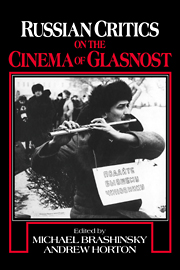Book contents
- Frontmatter
- Contents
- Acknowledgments
- Introduction
- Part One Films in a shifting landscape
- Part Two Glasnost's top ten
- I Repentance
- II Is It Easy To Be Young?
- II A Forgotten Tune for the Flute
- IV The Cold Summer of '53
- V Assa
- VI Commissar
- VII Little Vera
- VIII The Days of Eclipse
- IX The Needle
- X Taxi Blues
- Conclusion
- Directors' biofilmography
- Filmography
- About the contributors
- About the editors
- Index
I - Repentance
Published online by Cambridge University Press: 04 August 2010
- Frontmatter
- Contents
- Acknowledgments
- Introduction
- Part One Films in a shifting landscape
- Part Two Glasnost's top ten
- I Repentance
- II Is It Easy To Be Young?
- II A Forgotten Tune for the Flute
- IV The Cold Summer of '53
- V Assa
- VI Commissar
- VII Little Vera
- VIII The Days of Eclipse
- IX The Needle
- X Taxi Blues
- Conclusion
- Directors' biofilmography
- Filmography
- About the contributors
- About the editors
- Index
Summary
The film's narrative concerns three generations in an imaginary city ruled by a tyrant, Varlam Aravidze, whose name in Georgian means “nobody” and who dies early in the film. Repeated efforts to bury and keep buried the tyrant's large body prove fruitless, and this simple plot device becomes an allegory for horrors committed against the people by Stalin, Hitler, and other autocrats.
Repentance [Pokayaniye], directed by Tengiz Abuladze; screenplay by Nana Djanelidze, Tengiz Abuladze, and Rezo Kveselava; cinematography by Mikhail Agranovich; production design by Georgi Mikeladze; music compiled by Nana Djanelidze. Cast: Avtandil Makharadze (Varlam Aravidze, Abel Aravidze), la Ninidze, Merab Ninidze, Zeinab Botsvadze, Ketevan Abuladze, Edisher Giorgobiani, and Kahi Kavsadze. Color, 155 min. Gruzia-film Studios production, 1984.
1. The Middle Ages meet the present when totalitarianism is on trial in Tengiz Abuladze's richly textured, but one-dimensionally allegorical, preglasnost satire Repentance (1984). (Photo: Kinocenter and Sovexportfilm.)
The release of Repentance (1984) is one of those big events that certify that the order of our life is happily and inevitably changing.
Only yesterday such a picture would have seemed impossible. Working on it was an act of personal courage for director Tengiz Abuladze, his cowriters, Nana Djanelidze and Rezo Kveselava, and those leaders of the Georgian film industry who greenlighted the project.
Today the film is out. Our task is to decipher it aptly. But here is the unexpected rub.
Repentance is a truly philosophical work, complex and difficult, as it speaks to us in the language of metaphors and symbols, mixing up reality and imagination as well as epochs, costumes, and styles.
- Type
- Chapter
- Information
- Russian Critics on the Cinema of Glasnost , pp. 49 - 60Publisher: Cambridge University PressPrint publication year: 1994

